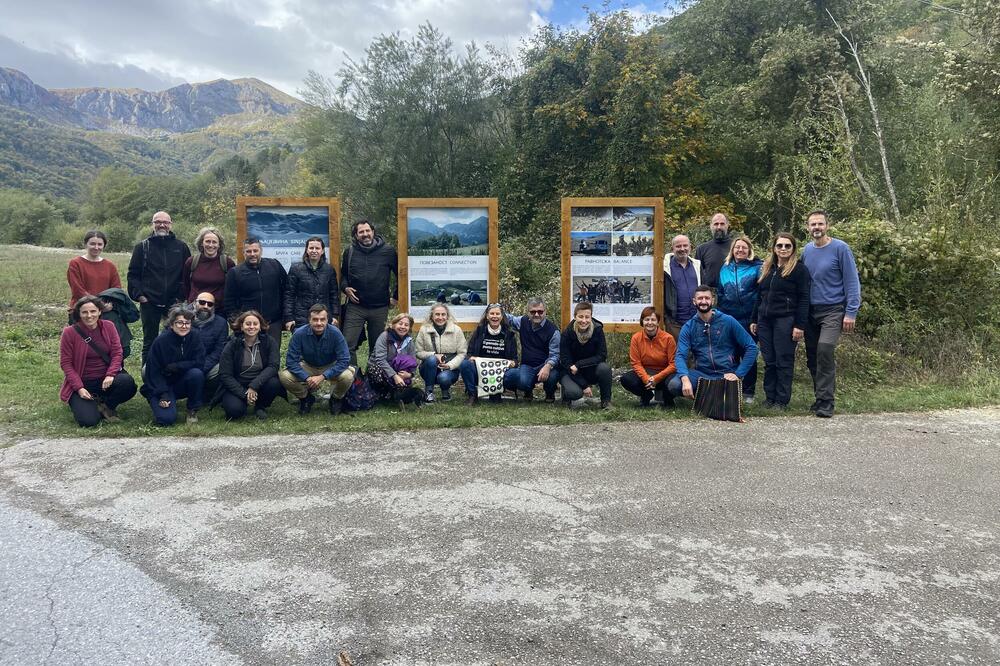Sinjajevina is a true gem of nature and a way of life that is significant not only for Montenegro, but also for the whole of Europe, is the message of a group of about 20 scientists from France, Spain, Italy, the United Kingdom and Montenegro who visited the largest Montenegrin mountain and pasture yesterday as part of the final conference of the European project "IRIS - Inspiring Rural Heritage: Sustainable practices for the protection and preservation of mountain landscapes and memories", which is being held in Kolašin from October 19 to 21, 2023, it was announced from the Citizens' Initiative (GI) "Let's save Sinjajevina ".
"Coordinator of the IRIS project in Montenegro, Pablo Dominguez, said that during more than three years, the Italian University of Genoa, the French National Council for Scientific Research (CNRS) and the University of Toulouse, the Spanish University of Granada, the British University of Durham and the University of Montenegro Gore, among others, did research together on rural heritage and sustainable practices in mountain areas in Europe. Now, he says, the core of this international team, co-financed by the EU, consisting of almost 20 scientists from five countries, has come to visit Sinjajevina," he writes. in the statement.
"This international scientific mission is motivated by the absolutely unique and exceptional natural and cultural heritage of Sinjajevina. The way of life that is still present in Sinjajevina is precious for Europe in a couple of aspects. First, Sinjajevina is one of the last places where traditional ecological agricultural activities continue exists in an authentic form and is in balance with the environment. At the same time, Sinjajevina preserves authentic cultural heritage, creates traditional products of outstanding quality that are very important for human health, and also ensures the survival and improvement of biodiversity that is dependent on traditional animal husbandry practices. Sinjajevina, furthermore , represents a gem of culture and national identity that must be protected and promoted. Science has come to study and publicly confirm these values of Sinjaevina, while at the same time being fully aware that Sinjaevina with all its values is under serious threat from the establishment of a military training ground, as and possible future mass tourism exploitation similar to the one on neighboring Durmitor, which has almost completely emptied that territory of traditional agricultural practices. Nauka wants to protect Sinjajevina from other plans that would be implemented without consultation with the local livestock community, which is the continuous creator of Sinjajevina's living heritage. The only authentic representatives of Sinjajevina are its inhabitants, herders, farmers, honey producers, collectors of medicinal plants, etc. "Sinjajevina, scientists confirm, preserves traditions that are needed now more than ever to create a sustainable future in accordance with the ecological transition," Dominguez said.
The IRIS project has been implemented since October 2020 in five European countries: Montenegro, France, Italy, Spain and the United Kingdom.
"The project aims to advance the socially and ecologically sustainable preservation, protection and use of mountain areas with their natural and cultural heritage. The project explores and develops a "living heritage" approach, promoting "protection through use" of mountain areas and neighboring rural areas. Project IRIS is co-financed through the Horizon 2020 framework program of the European Union for research and innovation, and is implemented by a consortium consisting of: University of Genoa, Italy as coordinator; French National Council for Scientific Research CNRS and University of Toulouse, France; University of Granada, Spain and University from Durham, United Kingdom," it added.
The implementation of the IRIS project in Montenegro is coordinated by the Laboratory for Environmental Geography (GEODE), CNRS and the University of Toulouse.
As stated in the announcement, the project is being implemented in cooperation with an interdisciplinary team of researchers and professors from the University of Montenegro.
"The pilot area of the IRIS project in Montenegro is Sinjajevina, which is the largest pasture mountain in Montenegro and one of the largest in Europe. Sinjajevina with katuns, seasonal mountain settlements, which are increasingly valued for their natural and cultural value, is still used by a significant number of herders. This is particularly significant for Montenegro, bearing in mind that the Administration for the Protection of Cultural Assets of Montenegro accepted the initiative for the protection of Katunovanje or the tradition of raising katuns, which could become part of UNESCO's Representative List of the Intangible Cultural Heritage of Humanity through inclusion to the already protected practice of Transhumance which is on this list. In fact, the Katunian way of life, as in other European countries, contributes to the creation and preservation of exceptional cultural landscapes that have been created over centuries, with a unique biological diversity that has evolved with that way of using natural resources, important ecosystem services, an agricultural system with extremely high-quality products and great eco-tourism potential," the announcement concludes.
Bonus video:







